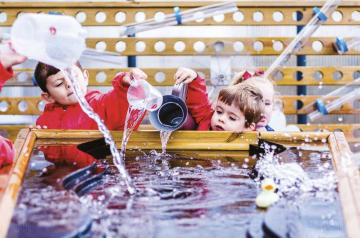MANY primary school teachers in the UK are worried about children’s lack of fitness, new research has shown. They fear pupils are becoming less and less active and 52% of those questioned in a recent survey said that many of their pupils would struggle to run a mile. The research was carried out in the run-up to a national UK TV campaign calling on schools to adopt The Daily Mile, a simple, INEOS-backed initiative which has been scientifically proved to improve fitness and concentration in class.
“The benefits of physical activity for children are beyond dispute,” said Gordon Banks, global director, The Daily Mile Foundation. “Active children are healthier and happier and we know that leads to better learning outcomes in the classroom.”
More than five million children in 98 countries now regularly take part in The Daily Mile, which encourages them to run or walk the equivalent of a mile every day.
“The proven success of The Daily Mile makes it clear that building healthy habits for life can be affordable, inclusive and simple,” said Elaine Wyllie, who founded it in 2012 when she was headteacher of a primary school in Scotland.
The latest research was carried out by The Daily Mile Foundation. Many (73%) of the 501 teachers questioned said they were concerned that many pupils actively avoided doing anything physical, even during break times, because those children were more likely to be disruptive in class.
It was a different story, though, for schools which had adopted The Daily Mile with teachers reporting better behaviour and increased concentration.
“The impact of increased physical activity is already being seen in schools who participate in The Daily Mile,” said Elaine.
Recent research by Sport England also showed that an active lifestyle can help to ward off illness in later life.
“Their report provided a timely reminder to us all of the life-enhancing benefits of sport and physical activity and the unique role it plays in bringing communities together,” said Gordon.
But what the report also highlighted was that those in poorer communities did not have the same access to sporting facilities.
“For some children, especially those in underserved communities, the school environment may be their only access to physical activity,” said Gordon. “But that’s where The Daily Mile can help.”
Previous research has shown that The Daily Mile has been especially effective in reaching disadvantaged school populations in urban areas with significant health inequalities.
“This uniquely positions The Daily Mile to address the challenge of transforming inactive children into active participants,” he said.
Recently MP Kim Leadbeater took part in The Daily Mile with children from Liverpool. She said the British government needed to look at cost-effective and practical measures that could be promoted now. “The Daily Mile is a brilliant example of that,” she said.
Survey may offer food for thought
RESEARCH is being carried out in Italy – with INEOS’ backing and financial help – to judge whether growing children are getting enough vitamin D in their diet. Pupils from two Italian secondary schools and a group of young footballers were asked to keep a daily log of what they ate for two weeks.
Researchers are now analysing the results to see whether the food provided the 260 boys and girls, aged 13 and 14, with enough vitamin D.
This project is fully in line with INEOS’ culture of leading a healthy lifestyle and shows our commitment to the next generation,” said Annalisa Lo lacono, who works in the HR department at INEOS Inovyn in Rosignano.
Growing children need vitamin D to thrive because it keeps their bodies healthy and builds strong bones.
Symptoms of vitamin D deficiency can include fatigue, depression, loss of appetite and bone pain. And the most common cause of it is a poor diet.
At the start of the project, staff from INEOS, which sponsors Rosignano Solvay football club, met teachers and parents to talk about INEOS Group’s involvement with some of the best and fittest sporting teams in the world – and why it is important for children, especially, to eat a healthy and balanced diet.
The results of the questionnaire – now being analysed by a university professor and a nutritionist biologist – will be known and shared with parents, teachers and all stakeholders later this year.
“The parents are very pleased because, based on the questionnaires, nutrition experts will be able to provide them with information on how to adjust their children’s diet to correct the vitamin D deficiency,” said Juna Cavallini, HR & Communication Manager at INEOS in Rosignano.











